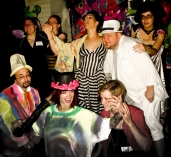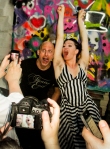 These thoughts were inspired by and are a sort of response to this post.
These thoughts were inspired by and are a sort of response to this post.
I get quite a bit of pushback for being a fan of Amanda Palmer. I get long, impassioned comments from people who are concerned that I don’t understand how problematic she is. The nice ones assume I am simply uninformed, and spend thousands of words filling me in on all of her offenses. The list is long and to these people, unequivocal proof that Palmer is unworthy of anything but insult, derision, and dismissal.
Those are the nice ones. There’s another level of hatred that shows up in my comments or inbox when the person knows I’ m aware of the controversies but have refused to banish Palmer from my playlists, my Twitter feed, and my esteem. I imagine their eyes bulging with rage as they type out their accusations that I am a hypocrite, a shill, or that I must also be a __________________. (Where the blank is filled with whatever label they use to dismiss her utterly; most often: racist, ableist, misogynist, narcissist.)
A few of her detractors are extremely committed: responding every time I mention her name, just to be sure I haven’t forgotten that she is problematic, persona non grata, enemy of justice, evil incarnate. They point out every possible thing I should be outraged by, every way my admiration for Palmer is complicit with her horribleness and contrary to their understanding of my values, especially my feminism, anti-racism, and anti-oppression commitments.
Not everything they say is wrong. There are times that Amanda Palmer makes me cringe. She’s done things that I wish she hadn’t. She’s said things that I strongly disagree with. She’s made mistakes. There have been times when I’ve been frustrated or disappointed with her comments or behavior. I’ve argued with her publicly about some of these things. And every disagreement has included the same word: (sometimes from her, sometimes from me) “Love.” And that’s why I’m still here, still a fan, still insisting that Palmer’s presence in my life, on the stage, and in the world is welcome.
This week, the controversy revolved around Jian Ghomeshi, the Canadian musician and broadcaster, who lost his job after allegations of sexual assault and abuse became public. Or rather, who released a statement saying he was unfairly fired because his sexual proclivities included what he called BDSM or “kink” practices. Over the course of several days, more and more women came forward (a total of nine, at last count) to corroborate the original charges: Ghomeshi had not sought consent and they had not given it, but had physically and sexually assaulted them.
What does this have to do with Amanda Palmer? Ghomeshi was one of the people Palmer had invited to participate in the book tour that begins next week. In nearly every city where she will be reading and performing, she invited a guest to share the stage and add to the conversation. Ghomeshi had agreed to join her onstage in Toronto, the final night of the tour.
As soon as the story about Ghomeshi broke, people—fans, not detractors—began to ask Palmer to rescind the invitation. Because it was so early, there was little more than the information that two women had come forward with accusations and Ghomeshi’s post explaining that his sexual practices were being purposely misconstrued and that he had lost his job as a result. Palmer posted Ghomeshi’s explanation and, sticking to her oft-spoken commitment not to avoid controversy, tweeted that Ghomeshi would still be guesting.
All hell broke loose then, as fans, haters, commenters, and the media all jumped into the fray. People were hurt, people were angry, and some people were supportive—all in the midst of a rapidly changing situation. By the time most people learned that of Palmer’s post, there were more and more women coming forward, corroborating the stories of abuse and providing disturbing details. The online media, always eager for a fight (and always happy to discredit a woman, especially a feminist) went live with stories in the tone of outrage and reproach.
I’ve been around long enough to see how the media portrays Palmer and these articles included all the same tropes. Palmer was narcissistic, out of touch, and happy to defend the powerful at the cost of her fans. They quote essays and blog posts that “point out that Palmer seemed to be leaning toward believing Ghomeshi…” without mentioning that those conclusions were drawn from one comment made before the details of the allegations were known. The articles are mocking in tone, faulting Palmer for asking for time to review the facts, to read the comments from her fans, and consider her decision.
It always amazes me how the media insist on the using and reusing the same three ideas to dismiss Palmer. In every article, she is out of touch with her fans, self-absorbed, and shallow. Even when all the evidence is to the contrary, they trot out these same judgments. It doesn’t matter that Palmer was deeply invested in the conversation with her fans, reading and responding to comments online—she’s still out of touch because she didn’t reply enough. It doesn’t matter that Palmer requested time to make a carefully considered decision—she’s shallow. It doesn’t matter that she’s sharing the stage as often as possible on this book tour—she’s self-absorbed and narcissistic.
Had Palmer decided to go on with the show and keep Ghomeshi as a guest, I would have been disappointed and even angry. I would have seen it as a way that even Amanda Fucking Palmer sometimes gets it wrong and believes men more than women. I would have taken that as evidence of how insidious sexism is, how deeply the messages of rape culture and misogyny can be internalized. I would have asked her to reconsider. And had she refused, I would have let my tickets to her shows go unused.
I respect Palmer’s decision, but there are many who are still angry. Mostly, they seem to be angry that she didn’t make the decision quickly enough. She did take some time—96 hours—to make her decision. Some are even angrier that she mentioned her current project—a musical theater performance at Bard College called The Bed Show—in her announcement. “Self-promotion!” they cry. Never mind that the show is relevant to both the topic and the timing of her decision. Palmer has been in 12-hour tech rehearsals in preparation for The Bed Show to open this Wednesday. The show, according to Palmer, also delves into issues of abuse and rape culture.
Is Amanda Palmer perfect? No. And I am happy that she is not. While some want their role models to be perfect, I like mine to be human. Part of what keeps me engaged with Palmer and her art and music is that she is transparent about her mistakes. Like any of us, she tries and fails and tries again to live up to her own ideals. Oh, and that’s another reason people are angry with her. She doesn’t just hold herself to high standards. She has, again and again, over the course of years, asked for people to be compassionate, civil, and refuse to be hateful. Some have confused this with tone policing.
Tone policing is a strategy used by the powerful to excuse and propagate oppression. When an oppressed person gets angry or is not grateful enough or kind enough to the oppressor, this “deficiency” is used as a reason to continue controlling them. This excuses the abuses of the oppressed and is the key way that oppression is internalized. In its crudest form, it can be as simple as a woman coming to believe she deserves to be beaten because she was not nice enough to her abuser. In more complex situations, it is used to silence the naming of oppression by redirecting attention from what is being named (the abuse or oppression) to how it is being named. (with anger, rage, vitriol.) Asking an oppressed person to “act nice” in response to their oppression or “be grateful” for what they do have is a strategy of shame and silence. It is real and it is wrong.
But Amanda Palmer’s request that discussion on her Twitter feed, blog, and Facebook page remain civil and not become hateful is NOT tone policing. The relationship Palmer has with her fans is not the relationship of oppressor to the oppressed, nor does she have the power to silence them. (I suppose she could delete comments, but I’ve never known her to do so.) In addition, she didn’t ask anyone to refrain from expressing anger. In fact, she doesn’t demand anything. She simply states, “ i am *not* happy to see people flinging insults, using violent language and wishing harm on others.” She later writes, “may we all hold the space – in the physical world and on the internet – to take care of each other. we’re in this one together, friends. please don’t forget that.”
This isn’t an effort to silence anyone, but to embody what Dr. Martin Luther King, Jr. taught when he wrote, “Hate cannot drive out hate: only love can do that.” I believe it’s possible—even necessary—for people to express anger, to disagree and debate, expressing their ideas and experiences powerfully without resorting to hate. In fact, I believe we need more debate, more public discussions—even arguments that fight the –isms that infect us all. I’m all for impassioned discourse about ethics, values, and how to make the world a better place. Amanda Palmer has shown herself willing to have those hard discussions. She’s shown herself willing to change her mind. She just asks that we do without hate, and I can’t fault her for that.







